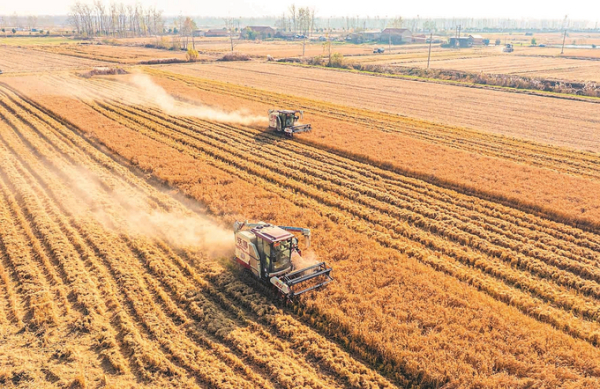Jiangsu's grain production tops 38 billion kg for first time

Jiangsu’s annual grain output has remained above 35 billion kilograms for 11 consecutive years, reaching a record 38.1 billion kilograms for the first time this year, according to the National Bureau of Statistics.
In early winter, a visit to Changlong Family Farm, located in Binhai County of Yancheng City, reveals fields of dense, ankle-high wheat seedlings. The farm owner, Tang Changlong, is planning to take measures to prevent the wheat from growing too tall, ensuring it can withstand the dropping temperatures.
Since contracting 100 mu (6.67 hectares) of land in 2012, Tang’s farm has practiced rice-wheat crop rotation and has now expanded to 1,500 mu. “We primarily grow Huai Rice No. 5, yielding about 650 kilograms per mu for rice and 600-650 kilograms per mu for wheat,” Tang said. He credits much of the success to high-standard farmland management and high-quality rice varieties.
Jiangsu has launched several research projects targeting breakthroughs in seed industry technologies, with institutions like Zhongshan Laboratory making significant progress.
Notably, wheat varieties such as "Yangmai 33", bred using molecular marker-assisted selection, are resistant to Fusarium head blight and have been widely promoted across Jiangsu. A japonica rice variety developed using whole-genome selection shows better performance in blast disease resistance, laying the foundation for significant yield increases. The first variety resistant to the brown rice planthopper, W097, is nearing completion of regional trials and is expected to enter the market within the next two years.
Recently, the Nanjing Fulian Planting Cooperative was awarded the title of "National-Level Eco-Farm" for 2023. The cooperative has established green agricultural production bases for rice, wheat, shrimp, and organic vegetables. By applying various technologies, the cooperative explores an eco-friendly development approach. It focuses on selenium-enriched rice and Yongning shrimp to promote a positive ecological cycle, enhancing the biological pest control capacity of paddy fields. Additionally, the cooperative has implemented technologies such as fully biodegradable mulch film for weed control and habitat manipulation for the conservation of natural enemies, ensuring the organic integrity of agricultural products.
Contact us at english@jschina.com.cn